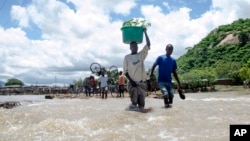The United Nations World Food Program reports it is scaling up life-saving operations for more than 2 million people in Malawi. The WFP said Malawi faces the worst food crisis in a decade following severe floods and drought that have ruined this year’s harvest.
The World Food Program warns more than 2.8 million people, nearly one-fifth of Malawi’s population, will face hunger in the coming lean season. This is the period between October and March - before the harvest, and after people have eaten most of their food stocks.
Unfortunately, this lean season will be particularly hard. Floods early this year - the worst in living memory - washed away homes and food stocks and ruined fertile land. The WFP notes surviving crops withered away during the intense drought which followed.
The WFP plans to help 2.4 million of the most vulnerable people. Private agencies will assist the other 400,000 in need. The U.N. agency said it needs $81 million to carry out its life-saving operation until March.
Of that amount, it said it urgently needs $10 million to save its school feeding, nutrition support and refugee operation from collapse.
School meals
WFP spokeswoman Bettina Luescher told VOA the value of school meals goes beyond providing food for hungry children, saying it acts as an important safety net.
“If a country gets hit by wars or droughts or floods, often the first thing is that they take their children out of school to make them work. If the parents know that they get school meals at school, then they keep their children in there. They will get an education. It is a long-term way to save a country,” said Luescher.
The WFP reports 42 percent of Malawi’s children have stunted growth, the result of being undernourished. Along with lost centimeters in height, the condition affects their mental development and has a lifelong impact on their health and productivity.
Luescher said the WFP already helped more than a million Malawians with cash vouchers, which they can spend on food in local stores. She said this program not only keeps hunger away, but gives a much-needed boost to the local economy.












